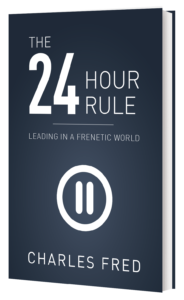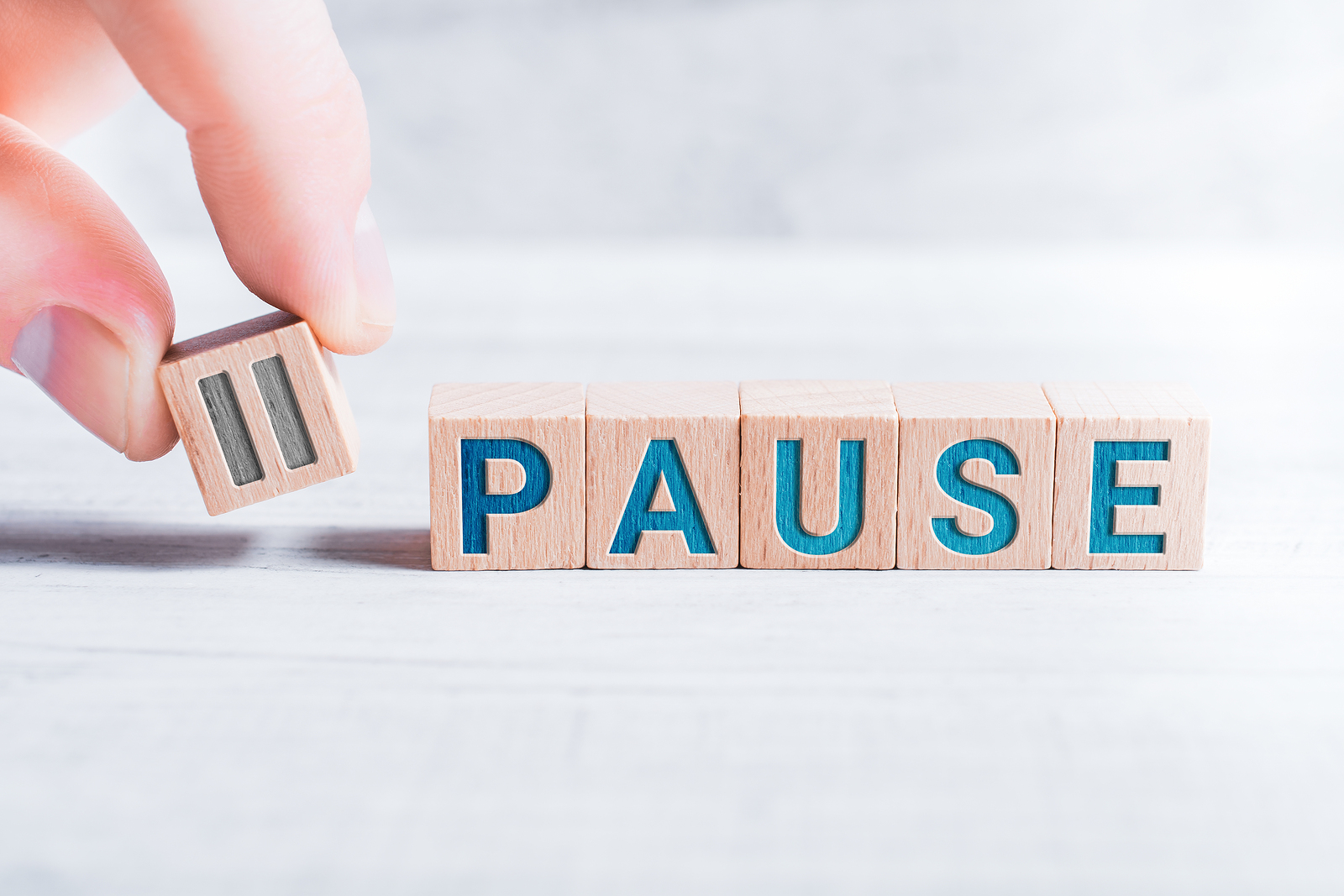Power of the Pause
In today’s fast-paced, frenetic world, leaders must rediscover a forgotten competency that can improve performance, strengthen relationships, and reduce stress. Charles Fred shares the power of the pause in his book, The 24 Hour Rule . It’s a short book with a powerful message.
Charles Fred is a bestselling author and serial entrepreneur. Today he focuses on the leadership role of second-stage entrepreneurs and their ability to create sustainable enterprises. TrueSpace, a firm he co-founded with his daughter Jamee, provides crucial know-how and capital for entrepreneurs aspiring to grow and reach the middle markets.
The One Thing Leaders Can Control
Share with us more about the discipline of pause?
As leaders, we can only control one thing: how we respond and react to other people. We can’t control the weather, politics, or the passage of time. Unfortunately, many of us, including myself, tend to get caught up in what we can’t control and lose sight of what we can. The discipline of pause is about becoming more intentional and disciplined about the one absolute power we have as leaders. It’s about giving ourselves the time that affords us mental clarity, so we can better control how we communicate with others. Because it turns out that when we become better about using this power and build it into a discipline we call, “pause,” we see dramatic improvements in the performance of people and organizations. Conversely, when we don’t, we unknowingly spread stress throughout our organizations, which research has long proven to be a mentally crippling force on people.
The discipline of pause is a simple, yet profound concept that enables us to gain control over what we already can control, which also has a significant impact on our ability to lead.
Some might say that the discipline of pause sounds like an invitation for leaders to delay important decisions. What would you say to them?
Pause is a discipline, not a delay. It’s not a waste of time; it affords us the time to deliberate before we act. Let me be clear. I’m an advocate for hustle, accomplishment, and achievement. I see those as valued characteristics for success. What I’m arguing against is the tendency of leaders to want to move as fast as possible and compress more activities into their day, such as firing off more emails and juggling more tasks. It doesn’t make us faster, but slower. It doesn’t solve problems, it creates them. And the consequences we see come in the form of stress. Unfortunately, leaders can’t see their impact because they lack a feedback loop—someone or something that tells them they are driving anxiety into their organizations and causing organizational harm.
Leaders Determine the Stress of the Business
The discipline of pause is not just your opinion. It’s based on extensive research. Can you explain?
Five years ago, I launched a study to observe entrepreneurs of post-startup businesses (companies that survive and mature beyond the startup phase). My team of researchers at a company called TrueSpace wanted to understand why these businesses, which experienced early growth, eventually stagnated. Our study has now expanded to analyze over 4,000 businesses in the United States. Our research effort identified a pattern in the actions and behaviors of the leaders struggling with the growth of their businesses. We discovered a problem in the way employees approached their roles, solved problems, and interacted with each other; poor-performing firms showed working environments of intense stress.
Our data pinpoints the source of this unnecessary stress: leaders. Leaders single handedly determine the stress levels of a business. Our research also confirmed the impact of stress on employee performance, which supports previous studies showing the negative effect of stress on cognition and memory.
 We all seem to know the importance of pausing, of meditating, of breathing, and yet we still find ourselves rushing to the next meeting, answering the next email, taking the next call. How do we instill pause as a discipline in our day?
We all seem to know the importance of pausing, of meditating, of breathing, and yet we still find ourselves rushing to the next meeting, answering the next email, taking the next call. How do we instill pause as a discipline in our day?
Pausing is up to the individual and the circumstance; there’s no universal formula. Pausing can take five seconds or 24 hours. It can mean taking a deep breath, meditating, going for a walk, etc. The important thing is that whatever pause we choose to take, it affords us the mental clarity to be deliberate with our decision-making.
And while the discipline of pause depends on the individual, we do recommend three important steps to begin the process. The first is awareness, the second is commitment, and the third is experimenting and evaluating.
Can you explain those three steps in more detail?
Certainly. First, we recommend that leaders become aware of stress in their workplace and how they may be contributing to it. Second is for leaders to commit to adopting the discipline of pause. That means talking with their teams about it and discussing how difficult it is. And last, we recommend that leaders take a full week to test out different strategies for pause to see what works and what doesn’t. At the end of the week, we recommend leaders reevaluate workplace stress and get their teams involved.
How do you coach leaders to become more aware?
That’s a good question. I believe workplace stress is both observable and measurable. As an outsider, you can detect a stressful work environment just by walking into one. For leaders, they should look for telling signs of workplace stress both in terms of behavior and performance, such as late-night and early-morning emailing.
Now the 24-Hour Rule. What does your research teach us about “sleeping on it”?
Great question. But again, let me be clear so your audience understands. The 24-Hour Rule is simply a moniker, or a label, for the discipline of pause. As I mentioned earlier, pause can mean five seconds or a full night’s sleep, but it doesn’t necessarily mean 24 hours. For big decisions, however, and by “big” I mean decisions that result in organizational change, pausing for a full-night’s sleep is shown to improve decision-making. Studies beyond ours have shown that our freshest mind is in the morning after a full night’s sleep. Our study confirms that when leaders adhere to this practice, they make better decisions.

